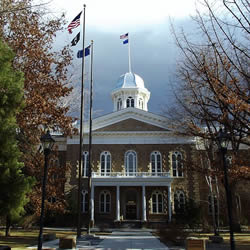When an amendment to the online poker bill that was passed by the Nevada state legislature last year was fast tracked, they really meant it. The bill, which eliminates language that would have required Nevada to wait for Federal regulation of the game prior to proceeding with online poker as well as provides for the state’s governor to be permitted to negotiate interstate poker deals, was passed unanimously with bi-partisan support in less than seven hours.
The bill having been declared an emergency measure, Nevada’s Republican Governor signed it into law immediately, inking his signature around 4 o’clock on Thursday afternoon.
Governor Sandoval, who previously served as the head of the state’s top gambling regulating body, the Nevada Gaming Control Board, declared the bill to be his number one priority when he gave his State of the State speech earlier this year and told lawmakers he wanted it passed within one month of the beginning of the legislative term. He got what he asked for.
“I think this was record fast,” Sandoval told the Las Vegas Sun. “This is an extremely important bill for our economy.”
Nevada has been scurrying to beat rival gambling hub New Jersey to begin offering real-money online poker games. Like in Nevada, the establishment of Internet poker is seen as being imperative to the economy, job preservation, as well as for hard-hit state and local governments, still reeling from years of a depressed housing market and weak economy wreaking havoc on public coffers.
While Las Vegas has seen an increase in revenue, as has Nevada as a whole, New Jersey has not been so fortunate. Revenue numbers have been declining in Atlantic City for some six years, with many would-be visitors instead choosing to visit newly-built casino resorts located in other states, particularly Pennsylvania. Last year it was reported that Pennsylvania has surpassed Atlantic City to become the nation’s second-largest gambling market.
In Nevada, news of the signing of the online poker bill was met with joy, as the state has long been working to position itself as the leader of the emerging US online poker market. The ability for the governor to establish interstate poker compacts was seen as being especially crucial, as companies can now attempt to capitalize on a much larger market by offering games to players located beyond Nevada’s borders.
Said Pete Ernault, a lobbyist representing the Nevada Resort Association, “We don’t have a universe of players.”
“So for us, what we get to offer to a state like California or Texas is that we have the most mature regulatory infrastructure. We have the most mature financial, auditing and collection capabilities, much greater than some of those states, and they have the players,” Ernault remarked.

